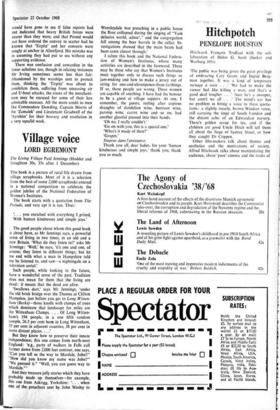Village voice
LORD EGREMONT
The Living Village Paul Jennings (Hodder and Stoughton 30s, 35s after 1 December) This book is a picture of rural life drawn from village scrapbooks. Most of it is a selection from the best of some 2,600 scrapbooks entered in a national competition to celebrate the golden jubilee of the National Federation of Women's Institutes.
The book starts with a quotation from The Prelude, and very apt it is too. Thus : . . you enriched with everything I prized, With human kindnesses and simple joys.'
The good people about whom this good book is about have, as Mr Jennings says, a powerful sense of living in two times, in an old and a new Britain. 'What do they listen to?' asks Mr Jennings: 'Well,' he says, 'it's one and one, of course; they listen to different things; but let me end with what a man in Hampshire told me he listened to, and saw—a nightingale on a television aerial.'
Such people, while looking to the future, have a wonderful sense of the past. Tradition does not mean for them that the living are dead: it means that the dead are alive.
'Swallows dart,' says Mr Jennings, 'under the old brick bridge over the Thames at Clifton Hampden, just before you get to Long Witten- ham (Berks)—those knolls with clumps of trees which dominate that landscape for miles are the Wittenham Clumps. . . . Of Long Witten- ham's 194 people, in a one fifth random sample, 26.3 per cent born in Long Wittenham, 35 per cent in adjacent counties, 38 per cent in more distant places. .
But they know how to preserve their innate independence; this one comes from north-west England: 'e.g., party of walkers in Fells call farmer down from 2,000 feet contour, one says, "Can you tell us the way to Mardale, John?" "How did you know my name was John?" "We guessed it." "Well, you can guess way to Mardale." ' And they treasure jolly stories which they have probably made up themselves—for example, this one from Askrigg, Yorkshire: . . when one of the preachers sent by John Wesley to Wensleydale was preaching in a public house the floor collapsed during the singing of "Vain delusive world, adieu!," and the congregation fell among the beer barrels in the cellar. In- vestigations showed that the main beam had been-sawn almost through.'
I salute this book and the National Federa- tion of Women's Institutes, whose many activities are described in the foreword. There may be those who say that Women's Institutes meet together only to discuss such things as jam-making and how to make a jersey out of string for one-and-elevenpence-three-farthings. If so, those people are wrong. These women are capable of anything. I have had the honour to be a guest at village suppers. At one, I remember, the guests, reeling after copious draughts of dandelion wine, beetroot wine, parsnip wine, carrot wine and so on, had another glassful pressed into their hands.
'Oh no, I really couldn't.'
`Go on with you, this is a special one.'
`What's it made of then?'
'G rapes.'
Stupeur dans Passistance.
Thank you all, dear ladies, for your 'human kindnesses and simple joys,' thank you, thank you so much.














































 Previous page
Previous page